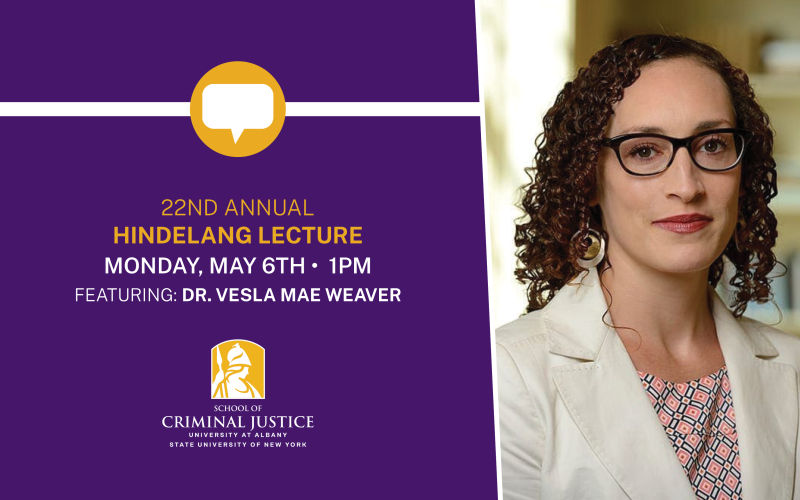Hindelang Center to Host 22nd Annual Lecture

“When Black Police Almost Changed the World: Black Police Political Organizations and Resistance to Racial Authoritarianism”
Featuring: Vesla Mae Weaver, Bloomberg Distinguished Professor of Political Science and Sociology at Johns Hopkins University
Monday, May 6, 2024
Reception at 12:30pm • Lecture at 1pm
Uptown Campus • Standish Room • Science Library 3rd Floor
The University at Albany’s Michael J. Hindelang Criminal Justice Research Center will host its 22nd Annual Lecture on Monday, May 6th, 2024, at 1pm in the Standish Room, located on the third floor of the Science Library. The lecture will feature Dr. Vesla Mae Weaver, speaking on the topic of, “When Black Police Almost Changed the World: Black Police Political Organizations and Resistance to Racial Authoritarianism.”
Vesla Mae Weaver (Ph.D., Harvard, Government, and Social Policy) is the Bloomberg Distinguished Professor of Political Science and Sociology at Johns Hopkins University, co-director of the American Prison Writing Archive, and faculty affiliate of the Justice Collaboratory at Yale University. A scholar of American politics, she writes about race, power, and political life.
About the Talk:
How do Black police officers operate within, define, and shape policing in a democracy characterized by ongoing legacies of repression and exploitation? Black police organized across the country in the late 1960s and mounted a critique of racial authoritarian policing. Over the next decade and a half, these organizations constituted one of the most important movements against racially authoritarian governance and one of the least acknowledged, written out of our contemporaneous accounts of abolition, racial injustice, and modern movements against police power.
In this talk, Vesla Mae Weaver explores the political efforts, resolutions, newsletters, first-person accounts, and sustained organizing by Black police leagues during the 1960s-1980s including the Afro-American Patrolmen's League, the Guardians Civic League, the Bronze Shields, Officers for Justice, Shield Club, among others, as well as the larger federations they were a part of. These groups and their leaders were not only central to resisting and attempting to curtail abusive policing — passing resolutions against stop-and-frisk and wanton use of lethal force, uncovering "drop gun" practices on unarmed residents — but also imagined and modeled a different way of responsiveness to Black communities by promoting civilian review, "black power through the law" (AAPL's slogan), initiating bottom-up efforts to investigate instances of brutality (such as the AAPL's Brutality and Complaint Referral Services), opposing police unions, and collaborating with community demands for greater resource investment.
It was not only that Black police formations saw themselves as being key intermediaries with black communities or contested the most extreme instances of police abuse or sought a more diverse and representative police bureaucracy; rather, they championed a different role altogether and enacted affirmative projects to serve the community and respond to safety deprivation, oriented toward nondomination and Black flourishing.
About the Hindelang Criminal Justice Research Center
The School of Criminal Justice administers externally funded research through the renowned Hindelang Criminal Justice Research Center. Faculty, research staff, and students work on research projects, develop policy recommendations in the field of criminal justice, disseminate research results through publications in leading scholarly journals, sponsor lectures and other colloquia, and provide opportunities for graduate students to learn research skills and develop dissertation topics.


